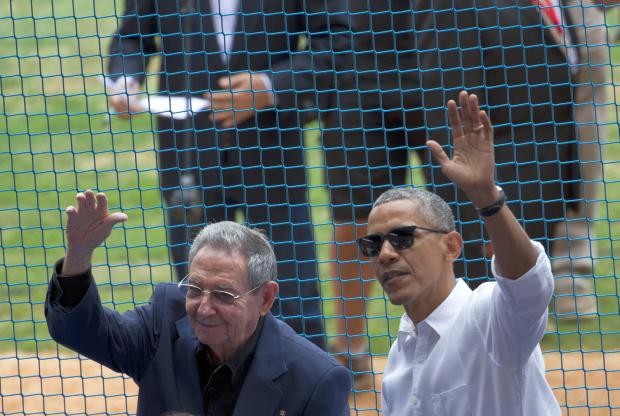Trump and Cuba’s future: questions after Castro’s death

This March 22, 2016 file photo shows US President Barack Obama, right, and his Cuban counterpart Raul Castro wave to cheering fans as they arrive for a baseball game between the Tampa Bay Rays and the Cuban national baseball team, in Havana, Cuba. Castro’s passing removes what was long the single greatest psychological barrier to a warmer US-Cuban relationship. But it also adds to the uncertainty ahead with the transition from an Obama to Trump administration. AP FILE PHOTO
HAVANA, Cuba – Fidel Castro led his country for 48 years and remained influential up to the time of this death at the age of 90 on Friday.
With the uncompromising revolutionary leader gone, questions about what lies ahead for Cuba abound.
A farewell to socialism?
No, at least that’s what analysts say.
“Cuba’s socialism has survived Fidel Castro’s long illness and will also survive his death,” said Jorge Duany, head of the Cuban Research Institute at Florida International University.
Under their Soviet-style government, Cubans get free health care and education — but also some of the lowest salaries in the hemisphere, less than $30 a month on average.
The state, which controls 80 percent of the economy, is clumsy and inefficient.
What will probably remain intact, with all its drawbacks, “is the model of a centralized welfare state, with a single political party that monopolizes the means of production and communications,” Duany said.
For Arturo Lopez-Levy at the University of Texas-Rio Grande Valley, Cuban society “is not one that take risks,” conservative in its attempts to maintain social tranquility.
Cuba’s budding political opposition therefore faces “the worst circumstances” because it is disconnected from “the fundamental problems of middle Cuba” on the one hand, and on the other, its main leaders identify with US President-elect Donald Trump’s call to claw back the diplomatic advances made under President Barack Obama.
READ: Analysis: Much uncertainty ahead in US-Cuba relationship
What about the economic opening?
Fidel Castro’s death will probably accelerate the economic reforms under his brother Raul, who took office in 2006, Duany believes.
“Maybe we have to wait for Raul to retire from the presidency in 2018” as he has promised, Duany said, “to see more clearly if there will be substantial changes in the leadership circle.”
Raul Castro has maintained the country’s socialist trajectory, but also cautiously opened up the economy to private enterprise and foreign investment.
Cuba is in better condition than it was before to continue those reforms, Lopez-Levy said. He believes the key to success are the good diplomatic relations consolidated during Raul Castro’s presidency.
The island “is more integrated than ever with the region,” having established ties with the European Union, Japan and other US allies as well as American rivals such as Russia and China, Duany said.
“The more ‘pragmatic’ faction of the Cuban government, led by Raul Castro, should now have more room to manoeuver” as it updates Cuba’s socialist model, he added.
Raul Castro has publicly insisted that reform will be carried out slowly, without sudden changes, and implemented when the necessary conditions are present.
And Trump?
In his first statement about Cuba since winning the November 8 election, President-elect Donald Trump reacted to Castro’s death by describing him as a “brutal dictator,” promising his administration “will do all it can to ensure… prosperity and liberty” for Cubans.
That pronouncement offended Jesus Arboleya, a Cuban academic and former diplomat.
“In a moment like this, which is particularly sensitive for Cubans due to the death of Fidel, to express oneself in this manner shows a tremendous lack of capacity to deal with international diplomacy,” he said.
“If any statement unifies the majority of the Cuban people,” he added, “it is a statement like this one, which is particularly offensive, disrespectful, even inhumane.”
Duany is more cautious.
“Everything indicates that relations between Cuba and the United States will be more strained under the Trump administration than under that of Barack Obama,” he said. “Nevertheless, we still don’t know what exactly the policy of the new president will be.”
How exactly Fidel’s death will affect the incoming Trump administration remains unclear.
“It would be rational that the demise of the revolutionary leader will ratify in Washington the diagnosis of Cuba as a country in transition,” Lopez-Levy said.
However, Arboleya believes Trump’s harsh statement about the late revolutionary icon “will affect the development of relations because it establishes a very negative precedent in the possibility of a dialogue” with the US government./rga














